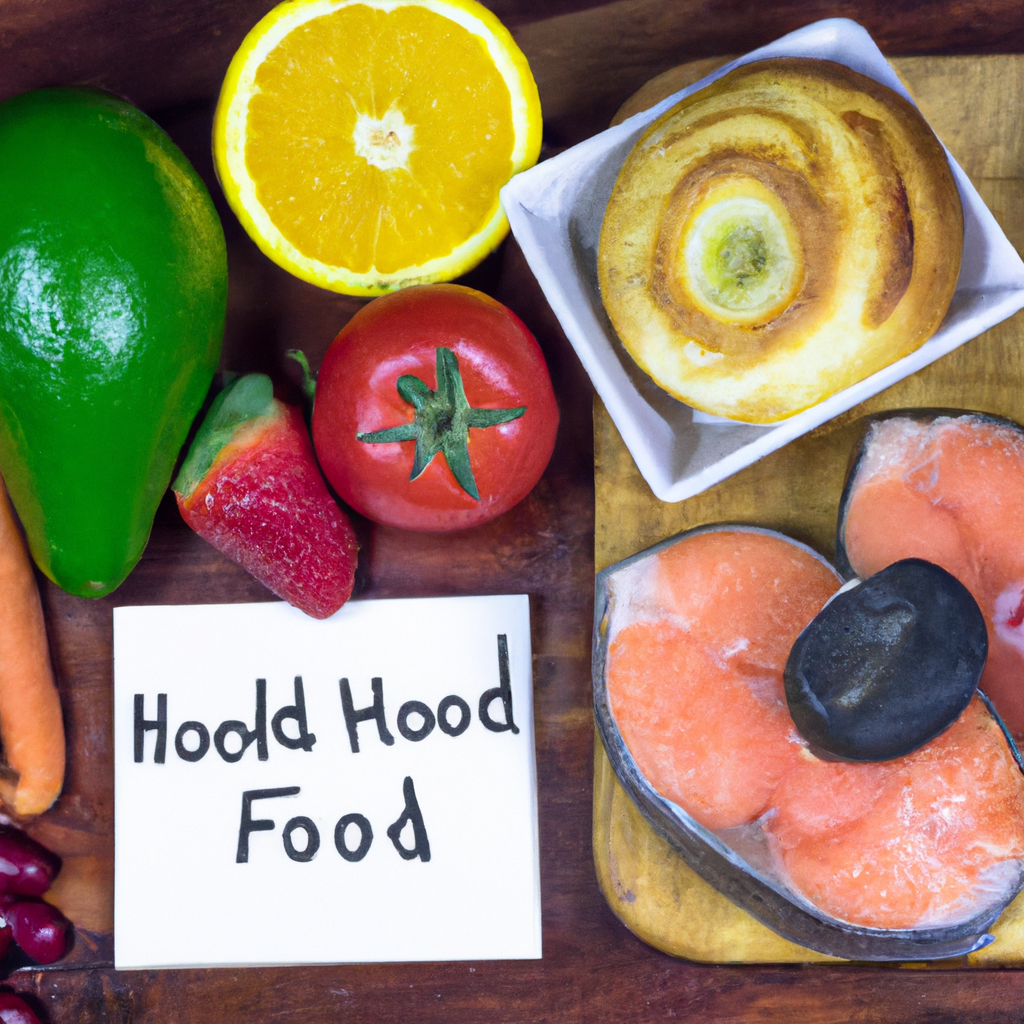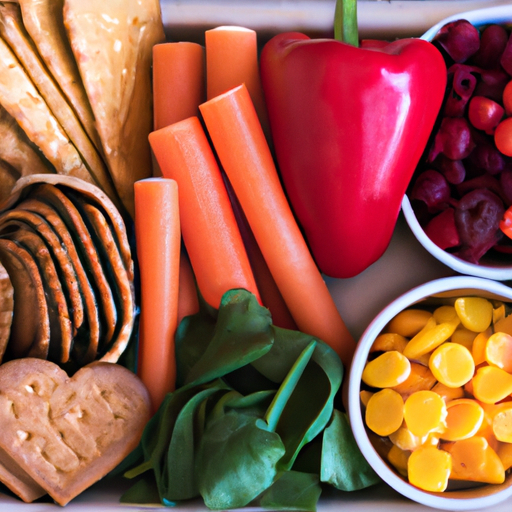Are you looking for a way to keep your heart healthy? Healthy eating is an essential part of a healthy lifestyle and can help reduce the risk of heart disease or a stroke. It’s not just about avoiding unhealthy foods – incorporating some superfoods into your diet can help your cardiovascular system stay strong and keep it running optimally. In this article, we’ll take a look at some of the top foods good for the heart and how they can fuel a healthy cardiovascular system.
1. Heart-Healthy Foods You Should Include in Your Diet
Eating healthy can be as easy as following simple guidelines. Incorporating heart-healthy foods into your diet is an essential part of looking after your cardiovascular system. Here are some foods you should make sure to include in your daily meals:
- Berries: Raspberries, blueberries, strawberries, and cranberries contain polyphenols, which help reduce blood pressure and break down harmful cholesterol.
- Fish: Fish such as salmon, tuna, and mackerel are packed with omega-3 fatty acids which help reduce inflammation that can be harmful to your heart.
- Vegetables: Vegetables such as spinach, kale, broccoli, and tomatoes are a good source of fiber that helps fights cholesterol.
It’s also important to include certain types of nutrients and oils in your diet. New studies suggest that monounsaturated fats, found in nuts, olive oil, and avocados, can lower cholesterol levels while polyunsaturated fats in foods like fatty fish can reduce inflammation. Make sure to include plenty of leafy green vegetables such as spinach, cabbage, and arugula in your diet for many more benefits.
2. Spice Up Your Heart’s Health with Flavorful Foods
Keeping your heart healthy doesn’t mean you have to resign yourself to a dull diet. There are plenty of flavorful and healthy options that can work together to create delicious and nutritious meals. Here’s how you can add a little spice to your heart’s health:
- Cumin: A staple of Indian and Mexican cuisines, cumin is an aromatic, earthy flavored spice with a slight peppery note. Studies suggest that cumin may be beneficial for heart health, due to its potential ability to lower cholesterol and reduce inflammation. Try adding it to soups and stews, rub it into proteins before roasting, or sprinkle it over guacamole.
- Cayenne: Another flavorful powerhouse, cayenne pepper is an intense, fiery spice made from dried and ground chili peppers. Not only is it a great source of antioxidants, but research shows it may have positive effects on cholesterol levels that can help protect the heart. Use it to add a little kick to your favorite dishes, from chili to stir-fry.
- Turmeric: It may not look particularly exciting, but this bright yellow powder packs a powerful punch. Turmeric is known for its anti-inflammatory properties, which can be beneficial for heart health. Try using it to season scrambled eggs, sprinkled over broccoli or Brussels sprouts, or even stirred into a smoothie.
Nutrition is the foundation of heart health, but with a few flavorful spices, you can easily add a bit of sparkle to your meals and help keep your heart in tip-top shape.
3. Taking Care of Your Cardiovascular System One Bite at a Time
Sharing meals with family and friends is a cornerstone of any culture, but did you know that you can turn delicious food into a cardiovascular health booster with the right ingredients? By watching what you eat and incorporating some excellent various choices into your meals, you can look after your cardiovascular system and prevent potential issues.
Start off by embracing fresh vegetables and fruits that are high in antioxidants. Researchers have found that antioxidants like Vitamin C, lycopene, and polyphenols help to lower inflammation, reduce plaque accumulation in arteries, and neutralize free radicals that can damage cells in the heart and arteries. Some of the best foods to include are:
- Berries like blueberries, strawberries, cranberries and cherries
- Citrus Fruits such as oranges, grapefruit, lemons and limes
- Leafy Greens like kale, spinach, and Swiss chard
- Nuts and Seeds like walnuts, peanuts, and flaxseeds
- Beans and Lentils like black beans, kidney beans and chickpeas
Additionally, stay away from processed foods and saturated and trans-fat. Swap these out for omega-3 fatty acids, which can be found in salmon, mackerel and tuna, flaxseeds, walnuts and pumpkin seeds. These fatty acids have been linked to a decrease in inflammation and help to regulate cholesterol and triglycerides levels.
4. Enjoy Foods Your Heart Will Love
Healthy heart eating doesn’t mean you just have to stick to bland foods. You can still enjoy the foods you love while maintaining heart health. Here are some tips to help you:
Focus on Fruits and Veggies: Incorporate a variety of fresh produce into your meals to provide your body the natural vitamins, minerals, and antioxidants it needs. Make sure to include lots of colorful fruits and vegetables every day so you can get the full range of nutrients your heart will love.
Eat Whole Grains: Eating foods made from whole grains like oats, quinoa, and brown rice can help keep your heart healthy. These nutrient-rich grains are packed with fiber, vitamins, and minerals that can provide your body with the fuel it needs to stay in good form. You can add them to your soups, salads, and other dishes to make your meals even healthier.
- Choose lean proteins like fish, beans, and skinless poultry.
- Fill half your plate with fruits and vegetables.
- Reduce salt and sugar in your diet.
- Include healthy fats like avocados, nuts, and olive oil.
Following a heart-healthy diet can open up an exciting world of delicious foods that not only prepare you for a healthy future, but can also be enjoyed in the present. You’ll be amazed at how tasty nutritious eating can be!
After reading this article, you now know the best foods for a healthy heart, so why not start serving up these tasty and nutritious meals in your very own kitchen today? Make the decision to make your cardiovascular system happy and enjoy the benefits of a healthier heart and life!
Eating a healthy diet is crucial for maintaining a healthy cardiovascular system. There is a wide variety of foods that can have positive effects on your heart. Here is a list of some of the top foods good for the heart to help you fuel a healthy cardiovascular system.
Oily Fish: Oily fish like salmon and mackerel contain essential fatty acids such as omega-3 fats that are good for cardiovascular health. They help to reduce inflammation and decrease bad cholesterol levels in the blood. Furthermore, they provide important nutrients to promote heart health including vitamin D and selenium.
Leafy Greens: Leafy greens are rich sources of vitamins, minerals and antioxidants, which are essential for proper cardiac functioning. They are also high in fiber, which helps to control cholesterol levels and reduce inflammation. Some of the best leafy greens for the heart are kale, spinach, collard greens and Swiss chard.
Berries: Berries are packed with heart-healthy antioxidants. They also contain a type of soluble fiber called pectin, which can help to lower cholesterol levels. Plus, they are low in sugar and calories, making them a great addition to any heart-healthy diet. The best berries for heart health include raspberries, cranberries, blueberries and blackberries.
Nuts and Seeds: Nuts and seeds contain healthy unsaturated fats, which are linked to a lower risk of heart disease. They also provide important minerals such as magnesium and potassium, which are important for healthy heart function. Good options include walnuts, almonds, chia seeds and flaxseeds.
Whole Grains: Whole grains are high in fiber and other important nutrients, which can reduce bad cholesterol levels, reduce the risk of heart disease and help maintain healthy blood pressure levels. The best whole grain options for heart health include barley, oats, quinoa and brown rice.
Incorporating these foods into your daily diet can help to support a healthy cardiovascular system. In addition, you should aim to limit unhealthy foods, such as processed and refined foods, saturated and trans fats, as well as sugar and sodium. Eating healthy will not only benefit your heart, but your overall health as well.
